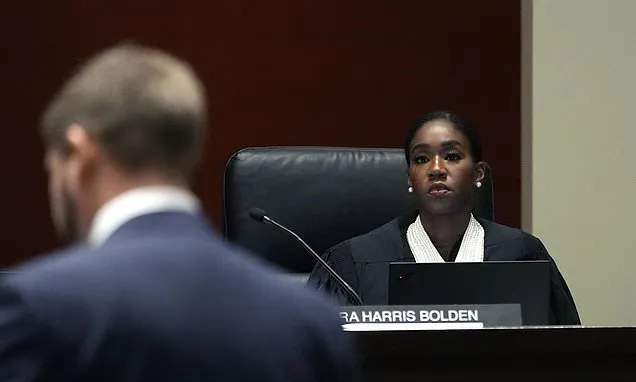LANSING, Mich. (AP) - During Michigan Supreme Court Justice Kyra Harris Bolden's first campaign, a critic told her she wasn't Michelle Obama or Kamala Harris, "but you feel emboldened to run for this office."
She later named her first child Emerson, so it could be shortened to "Em Bolden." The word has driven her ever since.
Bolden, now 36, won that race for the statehouse in 2018, and in 2022 she was appointed as the youngest-ever justice and first Black woman on Michigan's top court. Voters affirmed Gov. Gretchen Whitmer's choice by electing Bolden to her seat in November.
"It´s been a long journey for me," Bolden told The Associated Press, one that began generations ago when her great-grandfather was lynched and her family fled the South.
Michigan has a long legacy of electing women to its highest court. When Democratic-backed candidate Kimberly Ann Thomas joins Bolden on the bench in January, five of the seven justices will be women. It is the sixth time a female majority has made up the court, according to the Michigan Supreme Court Historical Society.
But only 41 Black women have ever served on a state supreme court, according to the Brennan Center for Justice, which tracks diversity in the judicial system.
Bolden´s election means that Black people in Michigan - about 14% of the population - still have representation. Across the state line in Ohio, where Justice Melody Stewart had been the first Black woman justice, her reelection loss makes for an all-white court.
In Kentucky, Court of Appeals Judge Pamela Goodwine became the first Black woman elected justice. Kentucky also will have its first female chief justice and, for the first time, a female majority.
It was an act of racial terror that sent Bolden on her path to the court. She didn't know the details until she was nearly a college graduate in psychology and spent some time with her aging maternal great-grandmother, who shared family recipes and history, including what really happened to Jesse Lee Bond.
According to the Equal Justice Initiative, Bond was lynched in 1939 in Arlington, Tennessee, after asking a store owner for a receipt. Bond was fatally shot, castrated and dumped in the Loosahatchie River. Two men were swiftly acquitted in the murder.
Bolden said she is still trying to reconcile with the trauma this caused.
"I wanted families to see justice in a way my family had not seen justice," she told the AP.
So she took action: earning her degree at Detroit Mercy Law School and working as a defense attorney before serving on the House Judiciary Committee, where she pursued criminal justice reform and domestic violence prevention.
"She believes in justice and believes in fairness for everybody," said her mother, Cheryl Harris, with pride heavy in her voice. "And to see her in this position - it´s making me tear up right now."
Goodwine, for her part, said she was inspired as a teenager by the work of Thurgood Marshall, the first Black U.S. Supreme Court Justice. She started as a court stenographer and worked her way up through the four court levels of Kentucky, making history at almost every step along the way.
"It is absolutely essential that our younger generations are able to see someone who looks like them in every position, particularly a position of power," Goodwine said.
Bolden broke another barrier knocking on doors as the first Michigan Supreme Court candidate to run while pregnant, according to Vote Mama Foundation, a group that tracks mothers running for office.
"There are so many people that don´t know that this is achievable," Bolden said.
U.S. Rep. Brenda Lawrence, a Michigan Democrat who served in Congress from 2015 through 2022, spent years working to see a Black woman like herself serve as a justice.
"I just sit back, you know, with such pride," Lawrence said. "She´s a hard worker and she´s what the state needs."
The Associated Press´ women in the workforce and state government coverage receives financial support from Pivotal Ventures. The AP is solely responsible for all content.
